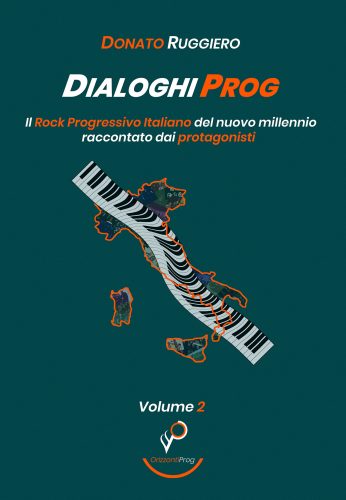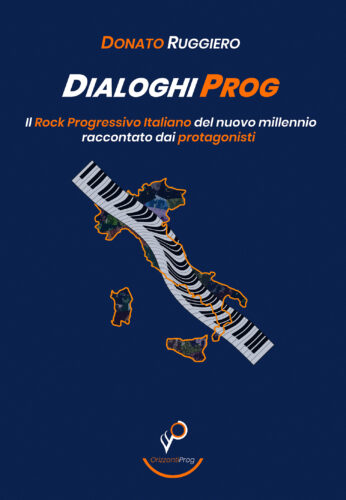 CHOCLAT FROG
CHOCLAT FROG
Snapshot (2021)
Autoproduzione
Chiusa l’esperienza The Stock (con cui hanno pubblicato l’album “Humanize”), i tedeschi Tim Ludwig (basso, chitarra, voce aggiuntiva in Part III) e Rainer Ludwig (voce, batteria, percussioni, tastiere, sintetizzatori, chitarra, flauto, programmazione) hanno proseguito il proprio cammino artistico lavorando sulle proprie idee sino a concretizzare il tutto in un nuovo album e un nuovo progetto: cHoclat FRoG.
Il nuovo lavoro in questione, intitolato Snapshot, nelle volontà dei due musicisti (e anche concretamente) è una sorta di collage di informazioni e tematiche varie (come ben evidenziato dalla copertina del disco) che viene “gettato in faccia” all’ascoltatore quasi fosse un programma televisivo che snocciola una serie di notizie, tra le più disparate (e, non a caso, la bilancia degli inserti vocali pende quasi completamente verso il parlato), il tutto avviluppato da un elemento sonoro che, lungi dall’essere lineare, affonda le proprie radici nel R.I.O. e avanza sempre sul filo della sperimentazione, della commistione di generi, della follia. Tanta tecnica e tanta inventiva racchiuse in undici tracce imprevedibili.
La voce, appunto, è una sorta di strumento aggiuntivo, spesso spiazzante, e i testi risultano davvero interessanti, con tanto di citazioni di John Locke, Jean-Paul Sartre, Luís Vaz de Camões, Jean Sibelius e Friedrich Nietzsche.
Da non dimenticare, inoltre, che, nella realizzazione di Snapshot, il duo ha visto anche la collaborazione di Christof Engel (assolo di chitarra in Part II e Part IV), Floyd Anthony (voce urlante in Part IV), Dietmar Appel (assolo di chitarra in Part V), Uwe Grunert (assolo di chitarra in Part VII e VIII) e Monica Ludwig (voce di “bambino” addizionale in Part X).
Caotica ci accoglie Part I (Opposites), prima che le distorsioni affilate di Tim (coadiuvate da ritmiche e voce) portino ordine e tensione in scena. Tensione che prosegue anche oltre nel parlato di Rainer (inframezzato da un luminoso solo di synth). […] The advertising ads try to sell things that nobody needs / Some politicians promise things nobody believes / Religions are telling us stories that can’t be true / Conspiracy theorists claim nonsense they don’t believe themselves / She’s a man he’s a woman, okay I don’t care / Vegetarism, veganism, carnivore, omnivore, eat what ever you want / Steaks are growing on trees, sausages in the sand / Climate is a global thing, believe it or let it be […]. E poi, quasi singhiozzante, il brano avanza sino a virare in un caleidoscopio di atmosfere che si muovono tra new wave, The Smashing Pumpkins e sperimentazione, tutto condito da un’indole zappiana. Un biglietto da visita niente male.
Part II (Army of the wise guys). Vivace il secondo capitolo di Snapshot, con il suo continuo cambio di protagonisti iniziale e l’andatura “comunitaria” seguente (da segnalare soprattutto i notevoli lavori di chitarra, dove c’è anche lo zampino di Christof Engel, e batteria). E tenendo ben ferma la sua anima rockeggiante, il brano avanza senza sosta, con bei cambi dal ritmo “sbilenco” e inserti sporadici parlati. Gli ultimi minuti vanno ad accentuare ancor più la vitalità dell’episodio e la sua “consistenza”.
Anche Part III (Philosophers) prende corpo privo di una fisionomia ben definita, un caos ben controllato dai cHoclat FRoG che trova la sua soluzione nei tasti di Rainer Ludwig e, in seguito, nell’andatura ipnotica di batteria e chitarre, con la voce piuttosto nervosa. E si avanza sempre con quella sensazione di nervosismo sulla pelle, nonostante il lungo soliloquio sintetico dello stesso Rainer. […] Knowledge can’t go beyond experience […].
All we need is just survive / We don’t need a miracle, no no / On demand from nine till five / Life is not a circle, go go […]. Piuttosto corposa la prima parte di Part IV (Useless talk), con i suoi suoni neoprog che lanciano la non furente cavalcata ritmica e le “interruzioni” vocali di Rainer (che narra un brano in portoghese tratto da “Lusíadas” di Luís Vaz de Camões). Sono poi le chitarre a cambiare le carte in tavola, dapprima vivacemente e in seguito con aggressività (con tanto di assolo accalorato interpretato da Christof Engel).
Anima “grezza” per i primi minuti di Part V (Need to survive), con un pizzico di The Cure. In seguito, cambio di passo guizzante e ripresa più rapida con un bel groviglio sonoro e vocale, con continui alti e bassi ritmici che tengono comunque sulla corda l’ascoltatore.
La breve Part VI (Everything…) è un fotogramma pazzoide, con qualche sentore alla Captain Beefheart, sorretto quasi completamente dalla voce di Reiner.
Nonostante la vivacità mostrata nelle prime battute, Part VII (Monsters – I need more bucks!) avanza a passo lento, con lievi intrecci sonori che camminano di pari passo con le parole di Reiner Ludwig. E poi una scarica elettrica scuote l’ambiente, anche se il sottofondo resta quasi immutato sino a subire una sferzata netta, che naviga tra progressive rock e R.I.O., con continui botta e risposta notevoli tra ritmiche e tastiere, prima di riconsegnare le chiavi del brano alla voce e al lungo assolo di Uwe Grunert posto in coda.
Part VIII (Metropolis). Se le prime note di piano sembrano “normali”, ciò che segue è in parte zappiano e in parte Rage Against the Machine. Ottimo il lavoro nelle retrovie di basso e batteria, grandi sostenitori delle bizzarrie sonore che spuntano qui e là lungo il brano e del solito lavoro vocale di Reiner.
Poco “raffinata” Part IX (The drinker), con le sue chitarre ruvide che avanzano incontrastate, sul “letto ritmico” ben disposto da Tim e Reiner. E quando arriva il turno della voce, la struttura non cambia di molto, ma acquista velocità e una sensazione quasi punk. E poi si va alla deriva tra le note sghembe di chitarra e tastiere, con batteria e basso che non si tirano indietro. Un salto a piedi uniti nel R.I.O.. Ultime battute leggermente più rilassate.
Esplosiva giunge Part X (Bastard neighbor), con la rabbia vocale di Reiner (comprensibile già dal titolo…) che emerge totalmente tra i deliri chitarristici e il passo compassato della sezione ritmica. E quanto segue è sempre più farneticante, un viaggio oscuro e urticante che stordisce sino all’assolo un po’ “sgraziato”, la seguente svolta rock’n’roll e il segmento finale ambiguo.
In coda Part XI (Where language ends music begins). Brioso ed elettrico, il capitolo finale di Snapshot si fa strada senza incontrare ostacoli, sino a buttarsi a corpo morto in soluzioni articolate che ricordano un po’ gli Accordo dei Contrari. Hanno tanto da dire i cHoclat FRoG in questo episodio è lo fanno senza paura, mutando scenografie e umori continuamente, con chitarre e ritmiche sugli scudi. Un ottimo modo per dirsi “addio”. […] Without music life is a mistake!.
Info: cHoclat FRoG
ENGLISH VERSION
 CHOCLAT FROG
CHOCLAT FROG
Snapshot (2021)
Self-production
After the experience with The Stock (with whom they released the album ‘Humanize’), the Germans Tim Ludwig (bass, guitar, additional vocals in Part III) and Rainer Ludwig (vocals, drums, percussion, keyboards, synthesizers, guitar, whistle, programming) continued their artistic journey working on their ideas until they materialized everything in a new album and a new project: cHoclat FRoG.
The new album, titled Snapshot, in the will of the two musicians (and also concretely) is a sort of collage of information and various subjects (as evidenced by the cover of the disc) that is “thrown in the face” to the listener as if it were a television program that pushes a series of news, among the most disparate (and, not surprisingly, the balance of the vocal inserts hangs almost entirely towards the spoken word), all wrapped by a sound element that, far from being linear, has its roots in the R. I.O. and always proceeds on the edge of experimentation, of the mixing of genres, of madness. A lot of technique and inventiveness contained in eleven unpredictable tracks.
The voice is a sort of additional instrument, often disorienting, and the lyrics are really interesting, with quotes from John Locke, Jean-Paul Sartre, Luís Vaz de Camões, Jean Sibelius and Friedrich Nietzsche.
It should also be mentioned that in the making of Snapshot, the duo collaborated with Christof Engel (guitar solo in Part II and Part IV), Floyd Anthony (screaming voice in Part IV), Dietmar Appel (guitar solo in Part V), Uwe Grunert (guitar solo in Part VII and VIII) and Monica Ludwig (additional “kid” voice in Part X).
Part I (Opposites) greets us chaotically, before Tim’s sharp distortions (supported by rhythm and vocals) bring order and tension to the scene. This tension continues even further in Rainer’s speech (interspersed with a bright synth solo). […] The advertising ads try to sell things that nobody needs / Some politicians promise things nobody believes / Religions are telling us stories that can’t be true / Conspiracy theorists claim nonsense they don’t believe themselves / She’s a man he’s a woman, okay I don’t care / Vegetarism, veganism, carnivore, omnivore, eat what ever you want / Steaks are growing on trees, sausages in the sand / Climate is a global thing, believe it or let it be […]. And then, almost sobbing, the song progresses until it turns into a kaleidoscope of atmospheres that move among new wave, The Smashing Pumpkins and experimentation, all dressed with a Zappa-esque nature.A respectable business card.
Part II (Army of the wise guys). The second chapter of Snapshot is lively, with its continuous change of protagonists at the beginning, and the following “communal” pace (especially noteworthy are the remarkable guitar work, with Christof Engel’s hand, and drums). Keeping its rockin’ soul firmly in mind, the track progresses without stopping, with nice changes of “unbalanced” rhythm and sporadic spoken inserts. The last few minutes accentuate even more the vitality of the episode and its “consistency”.
Part III (Philosophers) also lacks a well-defined physiognomy, chaos well controlled by cHoclat FRoG that finds its solution in Rainer Ludwig’s keys and, later, in the hypnotic pace of drums and guitars, with a rather nervous voice. And we always move forward with that nervous feeling on the skin, despite the long synthetic soliloquy of Rainer himself. […] Knowledge can’t go beyond experience […].
All we need is just survive / We don’t need a miracle, no no / On demand from nine till five / Life is not a circle, go go […]. The first part of Part IV (Useless talk) is quite full-bodied, with its neo-prog sounds launching the not-so-furious rhythmic ride and Rainer’s vocal “interruptions” (he narrates a song in Portuguese from “Lusíadas” by Luís Vaz de Camões). Then it’s the guitars that turn the tables, first brightly and then aggressively (with a heartfelt solo played by Christof Engel).
The first minutes of Part V (Need to survive) have a “raw” soul, with a hint of The Cure. Then there’s a quicker change of pace and a quicker resumption with a fine tangle of sound and vocals, with continuous rhythmic ups and downs that keep the listener on the edge of his seat.
The brief Part VI (Everything…) is a crazy frame, with some hints of Captain Beefheart, supported almost entirely by Reiner’s voice.
Despite the liveliness shown in the first notes, Part VII (Monsters – I need more bucks!) advances at a slow speed, with slight sound interlacing that goes hand in hand with Reiner Ludwig’s words. And then an electric shock shakes the environment, even if the background remains almost unchanged until it undergoes a clear whiplash, sailing between progressive rock and R.I.O., with continuous remarkable repetitions between rhythmic and keyboards, before giving back the keys of the song to the voice and the long solo by Uwe Grunert placed at the end.
Part VIII (Metropolis). While the first piano notes sound “normal”, what follows is partly Zappa-like and partly Rage Against the Machine. The bass and drums do an excellent job in the back, and they are great supporters of the bizarre sounds that appear here and there along the track and of Reiner’s usual vocal work.
Not so “elegant” Part IX (The drinker), with its rough guitars that advance undisputed, on the “rhythmic bed” well laid out by Tim and Reiner. And when it’s the vocals’ turn, the structure doesn’t change much, but it gains speed and an almost punk feel. And then it’s time to drift between the wavy notes of guitars and keyboards, with drums and bass playing along. It’s a walking leap into R.I.O.. The last bars are slightly more relaxed.
Explosive comes Part X (Bastard neighbor), with Reiner’s vocal rage (already understandable from the title…) totally emerging between the guitar ravings and the rhythm section’s compressed pace. And what follows is more and more rambling, an obscure and stinging journey that stuns till the solo, a bit “ungainly”, the following rock’n’roll turn and the ambiguous final segment.
In the coda Part XI (Where language ends music begins). Brisk and electric, the final chapter of Snapshot makes its way unhindered to the point where it plunges headlong into articulated solutions reminiscent of Accordo dei Contrari. cHoclat FRoG has a lot to say in this episode and they do it fearlessly, changing scenery and moods continuously, with guitars and rhythms on the shield. A great way to say “goodbye”. […] Without music life is a mistake!.
Info: cHoclat FRoG









Lascia un commento